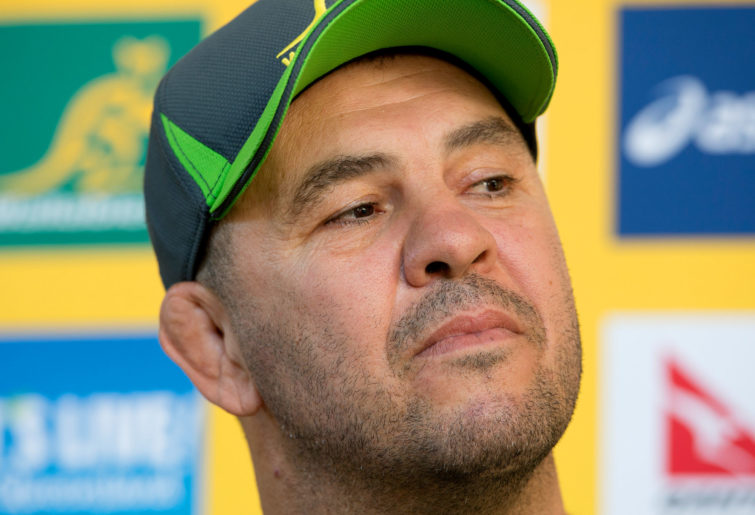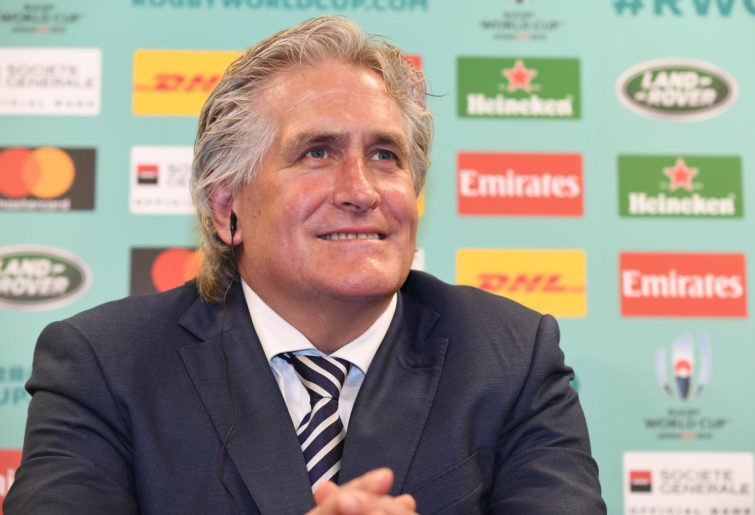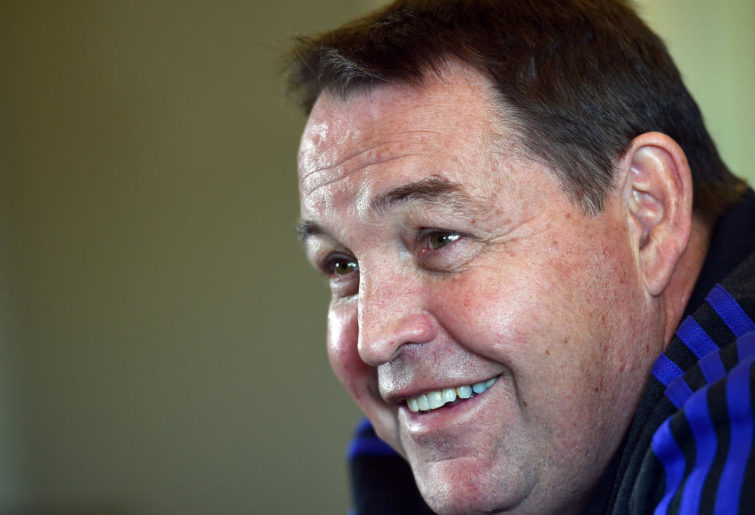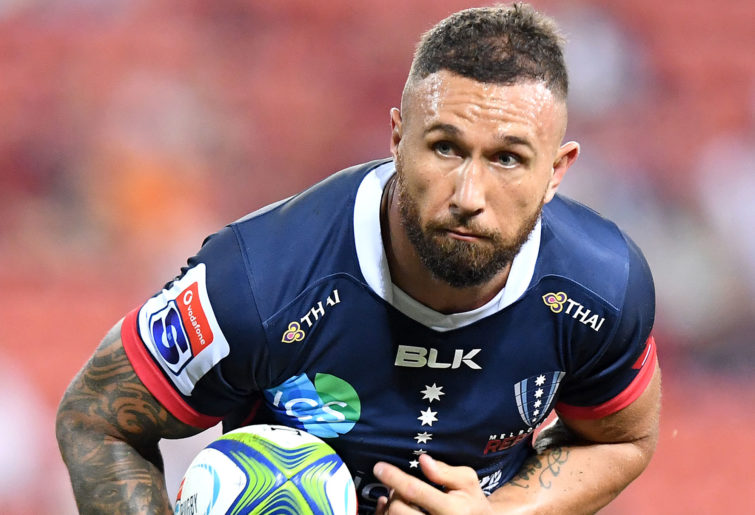Michael Cheika’s response to the storm of the calls for changes in the preparation of the 2019 Wallabies is to tell Rugby Australia officials and the wider rugby community, in effect, to belt up.
He seems adamant, despite his dismal record of four wins of 13 Tests last year and 17 wins out of 42 Tests since the 2015 Rugby World Cup, that he is in charge, full stop.
The embattled Wallabies coach told a Fox Sports panel in no uncertain terms that he is going to be his own man in preparing the national side for the 2019 Rugby World Cup tournament.
So much for the appointment of Scott Johnson, the new Director of Rugby and new selector along with Michael O’Connor, and nominally a person senior to Cheika in the RA hierarchy.
Talking about the sacking of Stephen Larkham, the former attack coach of the Wallabies, Cheika told his obsequious questioners that the replacement would have little input into tactics:
“The person we bring in will be someone I think that will be with the players, on the field a lot, not build a lot of strategy, more getting the players to embrace strategy and understand it so it’s automatic on the field.”
When asked who the new attacking coach might be and when he might be appointed, Cheika was vague to the point of being dismissive of the value of such an appointment:
“There’s no major hurry, we’re not training yet are we? There’s a few things that I want to unfold first and I probably reckon about May sometime in the lead-up to another camp. I’ve got a few people in mind. I’m not going to tell you because the people don’t know. They’re in Australia.”
Does this sound like someone who has even started the search for a new attack coach for the Wallabies with any sense of purpose?
It also suggests that Cheika will not allow the new attack coach much lee-way in constructing the new attacking game plan the Wallabies need so badly to be competitive at Tokyo.

(AAP Image/Dave Hunt)
This brings us to another remarkable, in the sense of remarkably stupid (in my opinion), way Cheika has looked for coaching guidance from people outside his coaching staff.
The people he has looked for ideas, he told Fox Sports, included Matt Giteau, Chris Latham, Phil Kearns, Charlotte Caslick and ‘some rugby league types.’
Unfortunately, he seems to be serious with this remark.
So, the new attack coach, who presumably is a qualified coach, is relegated to the coaching equivalent of water boy, and people with no coaching experience and in the case of the rugby league types no knowledge of rugby are being asked for their coaching insights.
Having endured his commentaries for years, I have grave doubts about what insights, aside from “the ref got that wrong!” that Kearns, for example, could offer any capable coach of the Wallabies.
And for the others, there is no evidence that any of them have had any success at the coaching level.
Having cited people outside Rugby Australia as sounding boards for coaching ideas, Cheika then explained to the Fox Sports panel that Scott Johnson would not really have a great deal of influence on his decisions:
“As autonomous as I am and as independent as I’ve always been, I always respect the chain of command or where my place is in the organisation… I’ll always make decisions with the right intent for the team to be in the best possible position …
“After Scott was appointed, he was pretty comfortable in making sure that I had the ability to deliver whatever style I wanted to bring … He’s got good experience internationally and he brings a different from the outside. That might encourage me to change one thing here.”
All this sounds very dismissive on Cheika’s part.
It sounds, as I’ve suggested, that Cheika is going to continue his coach as boss style, no matter who Rugby Australia impose on him by way of help.
I’d be surprised, too, if Johnson believed his role with the Wallabies going into a crucial Rugby World Cup tournament was to be a yes-man to the tactical decisions Cheika wants to make.

(Photo by Atsushi Tomura/Getty Images)
The curious aspect of all of this is that Cheika’s big weakness as a coach lies in the area of tactics.
He was out-coached, for instance, in the 2015 Rugby World Cup final when the All Blacks ramped up play from the beginning of the match with fast lineouts to capitalise on the convoluted defensive pattern the Wallabies took into the match.
Cheika did not alter the game plan or the tactics of the Wallabies for the final to take into account the specific strengths and weaknesses the All Blacks took into the match.
We now know why this was the case from remarks Cheika made some weeks ago in Dublin and confirmed to the Fox Sports panel.
He told an audience in Dublin recently that he hadn’t watched the recent Wales – Ireland Test in the Six Nations, even though Wales is in the Wallabies pool at Rugby World Cup 2019.
He explained all this away to the Fox Sports panel in these terms: “I’m doing a lot of things this year that maybe I wouldn’t have done before, like that. Not as much opposition analysis, I think the other guys are really good at that.”
At Dublin, too, Cheika revealed that he had not watched any of the matches of the Wallabies opponents during the 2015 Rugby World Cup tournament.
No wonder the Wallabies were out-thought, out-played and out-coached by the All Blacks in the final.
Rod Macqueen, the most successful Wallabies coach of all time, was a disciple of the principles of Sun Tzu. He based his coaching success around the aphorism of ‘know your enemy.’
In rugby terms, this means knowing intimately how your opponents play, what they do in specific situations, what their favourite exit plays are, what defensive alignments they throw on specific parts of the field and so on.
Steve Hansen, arguably the most successful coach in the modern era, always insists that his coaching is based on this principle: “Everything you do on the field is dictated by what the opposition does.”
In other words, ‘know your enemy.’

(AAP Image/Paul Miller)
We had a graphic insight into how this principle can work in practice during the Rebels – Sunwolves match over the weekend.
Earlier on in the match the Rebels broke away in the scoring with a brilliantly conceived try, engineered by Quade Cooper.
The Rebels had a scrum about 40m or so from the Sunwolves tryline and with enough of a blindside to keep the defending blindside winger near the touchline.
The outside backs were stacked across the far side of the field with the addition of the fullback in the attacking line.
The defending fullback read the attacking setup and went across the field to cover the attacking fullback.
Cooper, playing with his eyes, popped a grubber kick down through the vacant middle. The Rebels surged through on to the ball to allow Billy Meakes, impressive once again, to grab the bouncing ball to score an important try.
This try came from watching the videos of how the Sunwolves reacted to this set-up.
There is a reason why the Rebels are far and away the best of the Australian sides this year in the Super Rugby tournament.
They are the only Australian side that has the tactical awareness, in the forwards and backs, and especially in the halves, that can pull off plays like the Cooper grubby-kick ploy.
I would argue, too, that the bulk of the starting Wallabies side should be from the Rebels.
But is this likely to happen?

(Photo by Bradley Kanaris/Getty Images)
When Cheika was asked how optimistic he was about the Wallabies chances at Tokyo, he gave this puzzling (to me, at least) answer:
“Everyone has been part of teams where they’ve had that bad season and you’ve got to react accordingly to make sure the next season is a whole lot better… Maybe you want to turn up this year with something a little bit different. I’m not saying were going to do that but maybe we will… Some of those were already in program to be changed regardless of last year because if you want to do a few different things on the field then maybe last year isn’t a great time to show it.”
Is Cheika saying last year the Wallabies coaching staff had systems and plays that could help the side to do well in the Rugby World Cup tournament but didn’t want to alert opponents to these plays?
That is not believable. Teams do not deliberately try to lose Tests.
History has shown that the best way to win the Rugby World Cup tournament is to go into it with a strong winning record.
There were two occasions only when this did not happen, in 1995 and 2007. In both of these tournaments the Springboks won as underdogs.
There were, though, extenuating circumstances on both occasions.
In 1995 the Springboks were playing in their first Rugby World Cup tournament and at home with a new charismatic President, Nelson Mandela.
The Springboks, too, were led by a master coach, Kitch Christie, who died from cancer several years later.
In 2007 the Springboks, coached by Jake White, could not win Tests overseas but were virtually unbeatable at home. So the team was better than its record suggested.
The Springboks were fortunate that the two form teams, the Wallabies and the All Blacks, both got beaten, narrowly, in the quarter=finals.
White, also, was smart enough to bring in Eddie Jones to help him shape the tactics and systems for his Springboks.
Michael Cheika has his Eddie Jones equivalent in Scott Johnson. But is he going to use him?
































































































